Animal Feed Prices Increase 5 To 6 Times In Iran
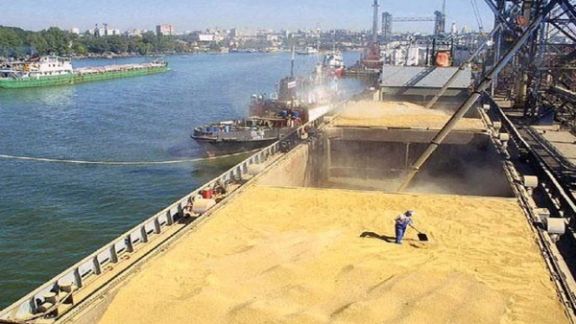
Following the sharp rise in food prices, such as vegetable oil, flour, chicken, eggs, and dairy products in Iran, the prices of animal feed have also increased five to sixfold.

Following the sharp rise in food prices, such as vegetable oil, flour, chicken, eggs, and dairy products in Iran, the prices of animal feed have also increased five to sixfold.
The head of Cattle Farmers Association, Ahmad Moghaddasi, told ILNA on Saturday that the price of barley, corn, and soybean meal have risen from less than 10 cents to about 60 cents per kilogram.
He added that the jump in the feed prices has also increased the price of live cattle by nearly 20 percent.
Soybean meal, barley and corn for livestock and chicken feed are mainly imported from Russia and other countries. Iran annually imports around 8 million metric tons of corn, 4.2 million metric tons of soybean meal, and 400,000 metric tons of barley for animal feed. Any shortages or higher prices can push up the price of meat further.
The head of the Flour Producers Association says this year Iran must import 20 million tons of grain – including 6 to 7 million tons of wheat -- noting that the country has never been so dependent on imports.
Anti-government unrest in Iran triggered by the sudden rise in food prices spread further on Saturday as state media and officials are in denial.
The average price of food for one person is estimated to be about 9,030,000 rials (about $30) per month and for a family of four it is about 36,120,000 rials (about $120). Considering the average minimum wage that is set at about 42,000,000 to 63,000,000 rials this year (about $140 to $200), a family of three to four must spend more than 85 percent of its income on food.
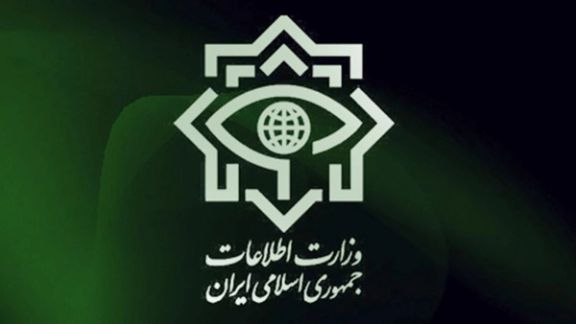
Iran’s Intelligence Ministry has blocked over 9,200 accounts belonging to 454 people due to illegal or undeclared transactions of currency and digital currency.
According to a statement by the ministry on Saturday, the total amount of transactions was over 600,000 billion rials – or about $2 billion in today's exchange rates.
The statement did not provide any details about the accounts, nor did it say how much of the turnover was in digital currency and how much was in fiat money.
Several people active in the digital currency market have been arrested in Iran since last year. Iran’s cybercrime taskforce is part of the Organized Crime Investigation Center, affiliated with the intelligence organization of the Revolutionary Guards (IRGC).
Iran’s currency has recently hit a four-month low against the US dollar as soaring bread prices created political and economic uncertainty in the country.
The US dollar is hovering over 300,000 rials in Tehran, one of its highest points since early January, when the currency was marginally recovering from previous lows on optimism over nuclear negotiations with the West. After talks in Vienna came to a standstill in mid-March, the currency began gradually losing its value again.
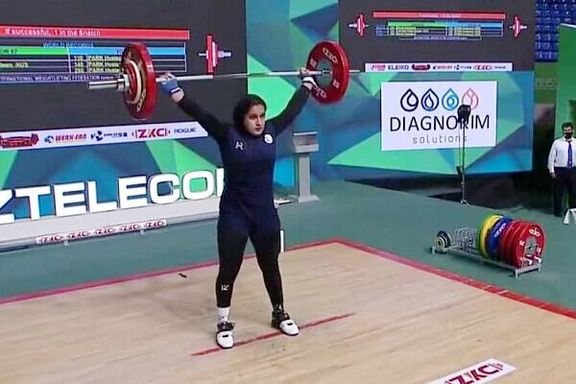
The first Iranian female weightlifter who won medals in international tournaments has sought asylum in Germany after she left Iran’s delegation at the World Junior Weightlifting Championship in Greece.
Seventeen-year-old Yekta Jamali disappeared from the hotel they were staying in Heraklion in the Greek island of Crete on the final day of the event Thursday after winning the silver medal in the snatch and finishing fourth overall during the week.
The Iranian delegation went to the police where they were informed about the incident with the assistance of the Greek federation and the organizers.
It is not the first time Iranian athletes leave their teams during international championships and seek asylum in other countries.
About 30 Iranian athletes in recent years have defected from Iranian national teams and sought asylum in other countries, including Judo champion Saeid Mollaei, Greco-Roman national team wrestler Ali Arsalan, and many others, due to alleged threats and corruption in sports federations as well as Iran’s policy of not allowing athletes to compete against Israel. For women mandatory hijab is also an issue.
Iran is a sworn enemy of Israel, calling for its destruction and prohibits sportspeople from playing against Israeli competitors. There is no legislation banning athletes but under pressure from federation officials, they usually lose games intentionally, forfeit matches or claim injury to avoid facing Israelis.
On Saturday, Parsia Jahanfekrian, another Iranian weightlifting champion, announced on her social media page that she has also left the national team.
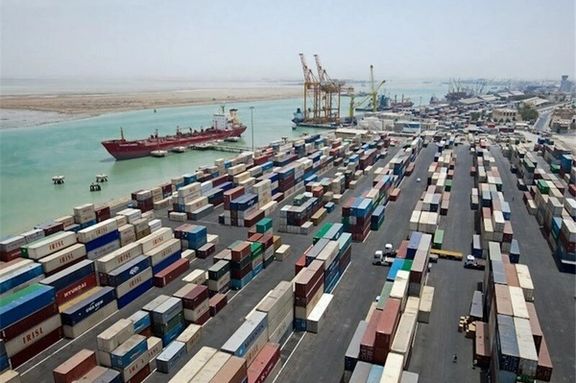
Tehran has announced that in the first month of the Persian year 1401 (April 2022), Iran’s non-oil exports grew 25 percent compared to the same month last year.
This growth follows a 40 percent increase in the country’s non-oil exports over the entire previous year, which reached $48 billion — a gain made possible by loose sanctions enforcement and global inflation in 2021.
When the Trump administration withdrew in May 2018 from the Iran nuclear agreement, formally known as the Joint Comprehensive Plan of Action (JCPOA), the reimposition of U.S. sanctions cut Iran’s GDP growth, put downward pressure on Iran’s oil exports, caused massive inflation, led to an exodus of foreign companies from Iran, and limited Iran’s access to both its foreign reserves and its oil and non-oil export revenue.
Under pressure from sanctions, Iran’s oil exports declined significantly. Tehran exported 2.6 million barrels per day in June 2018, the month after Washington withdrew from the JCPOA, but its exports fell to 800,000 barrels per day in December 2018 and further slid to 385,000 barrels per day in May 2019.
From there, Iran’s oil exports climbed upward, but have yet to return to their June 2018 high. Iran exported 555,000 barrels per day in December 2019, 1.1 million barrels per day in December 2020, 1.4 million barrels per day in December 2021, and 1.1 million barrels per day in April 2022, according to the UANI’s tanker tracker.
The sanctions against non-oil exports, however, failed to exert a comparable downward pressure. In 2017, Tehran exported $39.9 billion of non-oil goods. The following year, its exports slightly dropped to $39.6 billion, but in 2019 they jumped to $41 billion. Only in 2020, mainly driven by the pandemic-caused global recession, did Iran’s non-oil exports drop to $35 billion. A year later, though, Iran’s non-oil exports reached their peak of $48 billion.
Still, the removal of non-oil sanctions may lead to a further 15 to 25 percent increase in non-oil export revenue and will make that revenue more accessible than it now is. Given the lack of detailed data for Iran’s non-oil exports over the last few years, I reach this number by considering the change in prices during the forecast period against the price levels during the Persian year 1400. I use an average of oil price and the S&P GSCI Non-Energy Commodities index to create Iran’s exports basket. This assumption is based on the 50 percent share of oil-based products in Iran’s non-oil exports. As an alternative I create Iran’s export basket using the oil price and Global Price of Non-Fuel index. I then use the change in Iran’s exports from 2015 to 2016 (the year after the nuclear deal), with price changes taken into account, and use it to estimate how return to the revised JCPOA will affect Iran’s non-oil exports.
According to a report by the state-run Trade Promotion Center of Iran, key items in Iran’s non-oil exports were natural gas at $4.9 billion and 84 percent growth, polyethylene at $3.1 billion, methanol at $2.2 billion and 87 percent growth, and liquid propane at $1.9 billion and 96 percent growth. Four countries served as the destinations for 70 percent of Iran’s total non-oil export: Tehran exported $14.3 billion to China, $8.9 billion to Iraq, $6.1 billion to Turkey, and $4.9 billion to the United Arab Emirates.
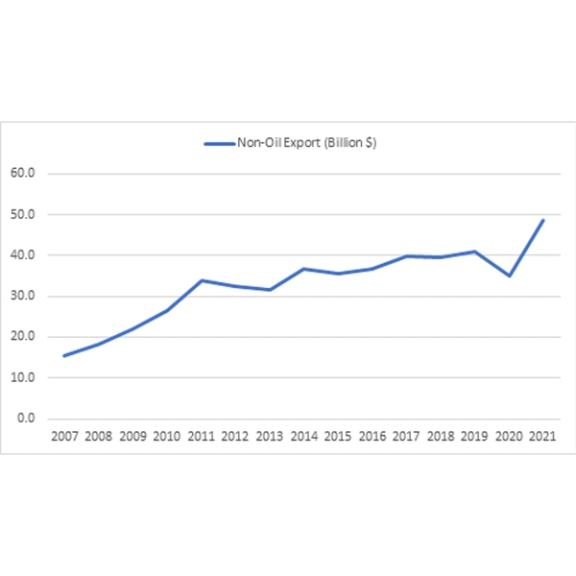
Source: Central Bank of Iran
The Central Bank of Iran’s data show a trend of consistent growth in Iran’s non-oil exports over the last 15 years. Two waves of sanctions — 2010-2013 and 2018-2020 — disrupted this upward trend but have failed to stop or reverse it. The massive jump in the Persian year 1400 (April 2021-March 2022) to $48 billion was driven largely by higher prices. This conclusion is based on a review of the weight of some key items in Iran’s exports such as methanol. However, due to lack of detailed data for all items, the conclusion is not definitive.
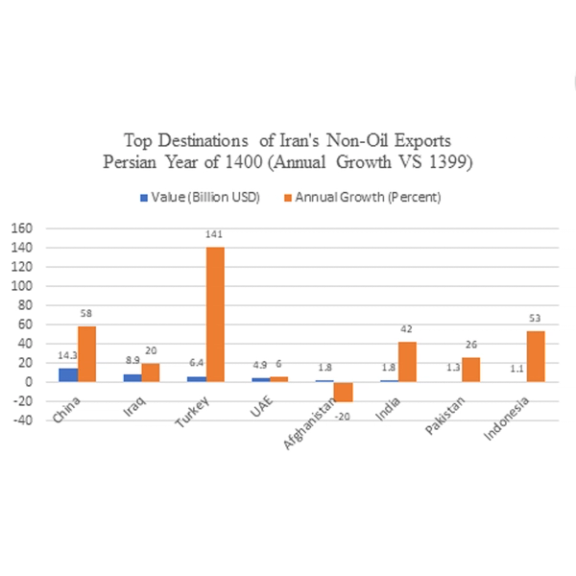
Source: Trade Promotion Center of Iran
The lax enforcement of non-oil sanctions has also played a role. Non-oil products are heterogenous and much easier to repackage, hide, and re-export, so enforcement is more difficult. Furthermore, many of Iran’s neighbors are keen to ignore Tehran’s sanctions busting activities, hoping to take advantage of related business opportunities. Even so, Washington could have enforced non-oil sanctions more effectively if it had decided to allocate more resources and political capital to its efforts.
If the United States lifts sanctions pursuant to a revised nuclear deal, Tehran’s non-oil exports could reach $55 billion to $60 billion in the first year of the deal. By increasing Iran’s oil and non-oil exports, lowering the cost of imports, and granting Iran newfound access to its foreign currency reserve, a revived JCPOA may provide Tehran with a financial package worth up to $275 billion in a 12-month period.
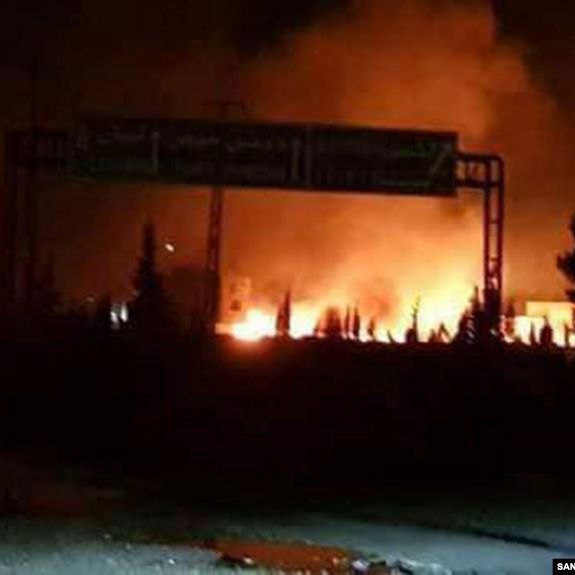
Israeli warplanes targeted central Syria in what state media claimed was an attack that killed civilians, while a war monitor said the Iranian military was hit.
The official news agency SANA said the missiles were fired at the town of Masyaf in the Hama countryside, claiming that several of them were shot down by Syrian air defenses. An unnamed military official was quoted as saying that five people were killed, including a civilian, and seven were wounded.
The Britain-based Syrian Observatory for Human Rights, a Syria war monitor, said Israeli aircraft fired at least eight missiles that struck weapons depots and sites belonging to Iranian militias in the Masyaf area, which led to several fires. Ambulances were seen rushing to the area, it added.
There was no immediate comment from the Israeli military on the attack, which the Observatory said was the 12th Israeli attack on Syrian territory since the beginning of the year. The Observatory has a network of activists on the ground in Syria.
Israel has been targeting Iranian weapons and bases in Syria since 2017, with hundreds of raids in five years. It has vowed not to allow Iran to entrench itself in the war-torn country and transfer weapons to it Lebaese proxy, the Hezbollah.

Former British-Iranian hostage Nazanin Zaghari-Ratcliffe on Friday told Prime Minister Boris Johnson that an incorrect comment he made as foreign secretary had a big impact on her six-year detention in Iran.
Zaghari-Ratcliffe returned to London in March when she was released along with another dual national after Britain repaid a historic debt.
It was the first time she had met Johnson, who in 2017 erroneously said she had been teaching people journalism before her arrest in April 2016. His comment contradicted statements made by Zaghari-Ratcliffe and her employer, who said she had been on holiday visiting family.
She was subsequently convicted of plotting to overthrow the clerical regime.
Johnson later apologized and retracted any suggestion that Zaghari-Ratcliffe was there in a professional capacity.
Her local member of parliament, who attended the meeting, said Zaghari-Ratcliffe had told Johnson to his face about the problems his mistake had caused.
"I had to say the prime minister looked quite shocked," Tulip Siddiq told reporters.
It is not clear if Iran would have released Zaghari-Ratcliffe earlier if Johnson had not made the mistake.
Her husband, Richard Ratcliffe, said Johnson did not explicitly apologize for his error, but the encounter had not been "abrasive".
"It was an honor to welcome Nazanin, Richard and Gabriella to Downing Street today," Johnson wrote on Twitter, but he did not address his mistaken comment in 2017.
"We discussed the UK’s work to secure the release of unfairly detained nationals in Iran and I commended Nazanin for her incredible bravery during her ordeal."
Reporting by Reuters